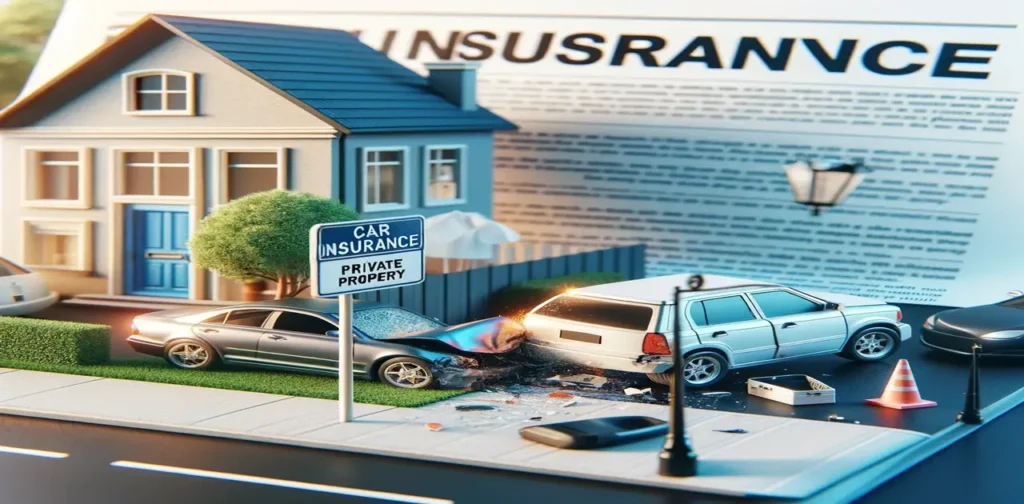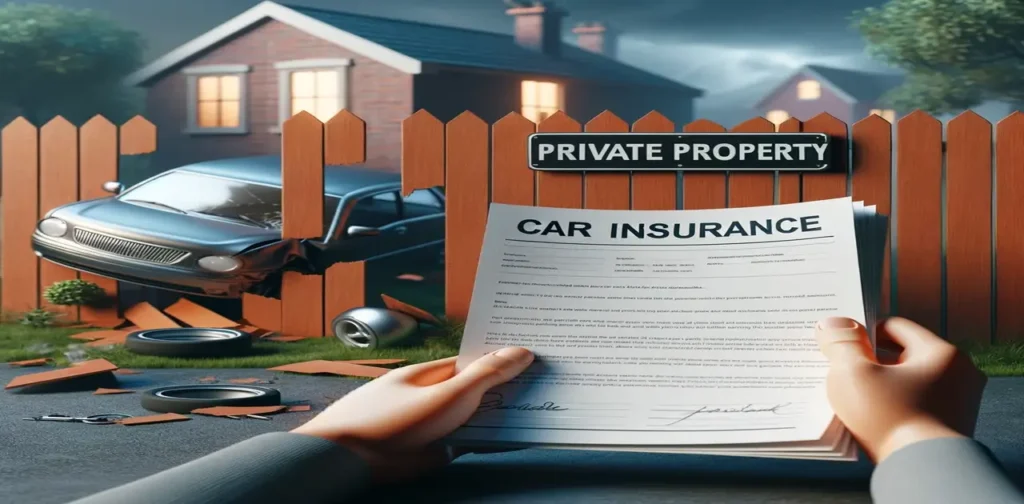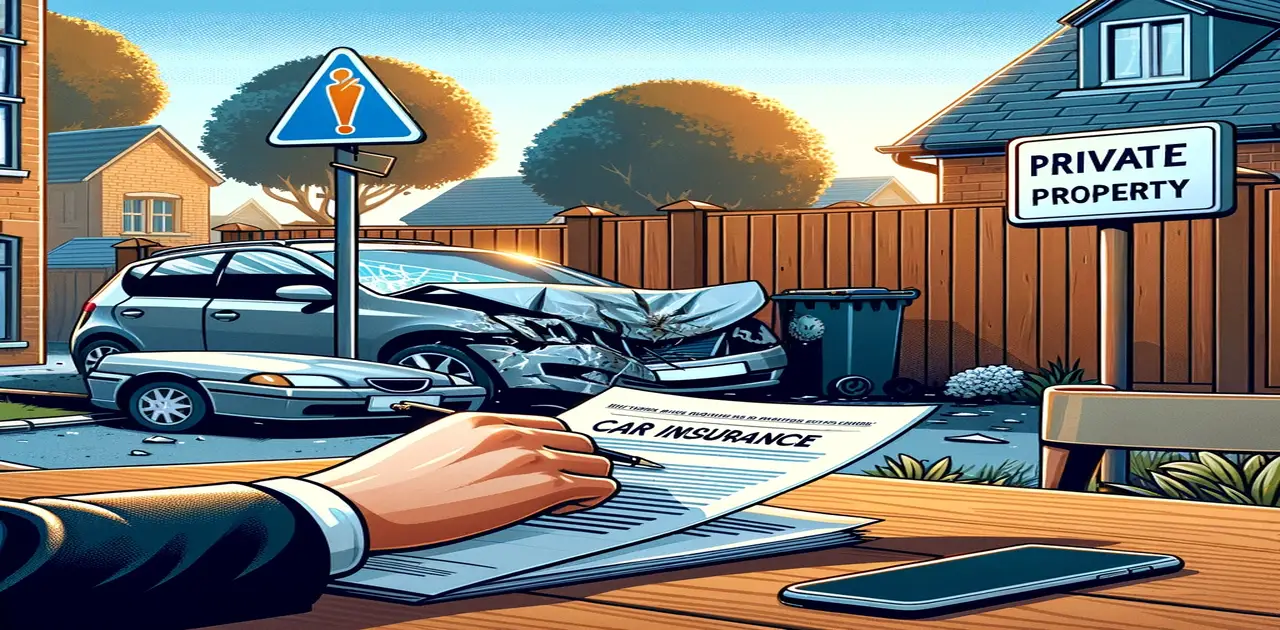Car insurance coverage for accidents on private property is a common concern for vehicle owners. It’s essential to understand the extent of your insurance coverage, as accidents can happen anywhere, including private premises.
Every driver should have car insurance. Car insurance is necessary for financial protection, but many drivers worry about coverage for accidents on private property.
This article addresses this concern and examines whether car insurance policies cover such incidents. It provides information on what to expect and how to deal with collisions in private places. So, today, I will address a common worry: Does car insurance cover accidents on private property?
So, let’s jump right in and find out what you need to know for peace of mind and financial stability.
Does Car Insurance Cover Accidents On Private Property?

Car insurance coverage for accidents on private property may vary. Some policies may cover such accidents. Others may specifically exclude them.
However, reviewing your policy to understand what is covered in case of an accident on private property is essential.
Examining Standard Car Insurance Policies
Regular car insurance covers accidents on public roads. However, incidents on private property may have different rules. Some policies include coverage for such accidents, while others might not.
Look closely at your car insurance policy to know exactly what’s covered. Pay special attention to accidents on private property.
Coverage Variations Between Insurers
Coverage for accidents on private property differs among insurers. Some may provide comprehensive coverage, while others could have exclusions or limitations.
Compare car insurance policies to make sure you have enough protection. Carefully review the coverage terms for private property.
Factors Affecting Coverage On Private Property
Car insurance policies can vary in coverage for accidents on private property. Several factors can influence this coverage.
These factors include:
- Policy exclusions: Some insurance companies have exclusions for accidents on private property.
- Property ownership: The property’s ownership status can impact the coverage. It may belong to you or someone else.
- Type of accident: The type and severity of the accident can also affect the coverage provided.
- Policy limits: Your car insurance policy limits determine the maximum coverage for accidents on private property.
However, talk to your insurance provider. Clear up any questions about coverage on private property. In addition, this ensures you have the right level of protection.
What to Do If You Have an Accident on Private Property?
If you have an accident on private property, take certain steps to ensure a smooth claims process.
- Stay calm and assess the situation.
- Check for injuries and call for help if needed.
- Move vehicles to a safe spot if possible.
- Exchange information with the other party involved.
- Take photos of the scene and any damages.
- Report the accident to the property owner, if applicable.
- Consider contacting the police to document the incident.
- Notify your insurance company as soon as possible.
- Seek medical attention for any injuries.
- Keep records of all relevant information for future reference.
What To Do In Case Of An Accident On Private Property?
The coverage for car accidents on private property can differ based on your insurance policy. Some policies include this coverage, while others explicitly exclude it.
Review your policy to know what your insurance covers in case of an accident on private property. Contact your insurance provider for clarification.
Reporting The Accident To The Police
Accidents on private property might not lead to citations. However, it’s essential to report them to the police. Doing so helps establish a documented record. This is crucial when filing an insurance claim.
Documenting The Incident
Once you’ve reported the accident to the police, it’s crucial to document the incident thoroughly.
Take photos of the scene and any vehicle damages. Collect contact information from witnesses. These pieces of evidence can be crucial support when filing an insurance claim.
Filing An Insurance Claim
After reporting and documenting the accident, the next step is to file an insurance claim.
Contact your insurance provider as soon as possible to start the claims process. Provide them with all the necessary information. This includes the police report and any documentation or evidence you have collected.
Make sure you understand the specific coverage your car insurance policy provides. This includes accidents on private property.
While some policies may include coverage, others may exclude such incidents. Making sure you have the appropriate coverage can make the claims process smoother.
Summary:
- Report the accident to the police department and get a written report.
- Document the incident by taking photos and obtaining witness information.
- Contact your insurance provider to file an insurance claim.
- Ensure you have the appropriate coverage for accidents on private property.
Additional Coverage Options for Accidents on Private Property
Car insurance usually covers accidents on private property. However, some choose extra coverage for added protection. Personal Injury Protection (PIP) covers medical expenses and lost wages, regardless of fault.
Uninsured/Underinsured Motorist Coverage is another option. It protects you in accidents with uninsured or underinsured drivers.
These more options offer peace of mind. They ensure you’re well-protected in any situation.
Tips for Navigating Car Insurance Claims on Private Property Accidents

Navigating car insurance claims, especially for accidents on private property, can be complex.
To ensure a smooth experience, follow these tips:
- Review your policy: Understand the terms. Focus on exclusions or limitations for private property accidents.
- Document the accident: Take photos of the scene and damages. Gather information, including witness statements and police reports.
- Communicate with your insurance company: Notify them promptly and provide the necessary details. Cooperate fully and keep a record of all communications.
- Seek legal advice if necessary: If your claim is denied or issues arise, you should seek legal advice. This will protect your rights and ensure fair treatment.
Common Misconceptions about Car Insurance Coverage on Private Property
Common misconceptions about car insurance coverage on private property exist. Insurance is unnecessary on private roads.
However, accidents can happen anywhere. Therefore, insurance is crucial for financial protection.
Another misconception is that the property owner’s insurance covers all damages. It may cover damages to their property. However, it usually doesn’t include damages to your vehicle. It also doesn’t cover liability for injuries to others.
Yet, relying on your car insurance policy for comprehensive coverage is crucial.
Frequently Asked Questions
What Happens If You Have A Car Accident On Private Property In Georgia?
In Georgia, if a car accident occurs on private property, the at-fault person may not receive a citation. Still, it’s crucial to report the accident to the police and obtain a written report. Car insurance generally covers accidents on private property. However, it’s advisable to check your policy for specific coverage details.
What Kind Of Insurance Would You Use If You Crash Your Car Into A House?
If you crash your car into a house, your car insurance will cover the repairs to your vehicle. This is through collision insurance. However, it won’t cover the property damage. In that case, you might need to rely on your home insurance.
Can I Lose My House Due To A Fault Car Accident In NC?
Yes, losing your house due to an at-fault car accident in NC is possible if you are sued for damages. If the court determines that you are at fault for the accident and the damages exceed the value of your home.
Does Car Insurance Cover Accidents On Private Property?
Yes, car insurance generally covers accidents on private and public property. Your insurance should cover property damage and injuries. It should cover them in a parking lot or on a public road.
Sum Up
The coverage for car accidents on private property depends on your specific policy. Some policies include coverage, while others may exclude it.
Review your policy. Consult your insurance provider to understand coverage for accidents on private property.
Always report the accident to the police and get a written report, even without a citation.

6 thoughts on “Does Car Insurance Cover Accidents on Private Property? Unveiling The Secrets Truth”